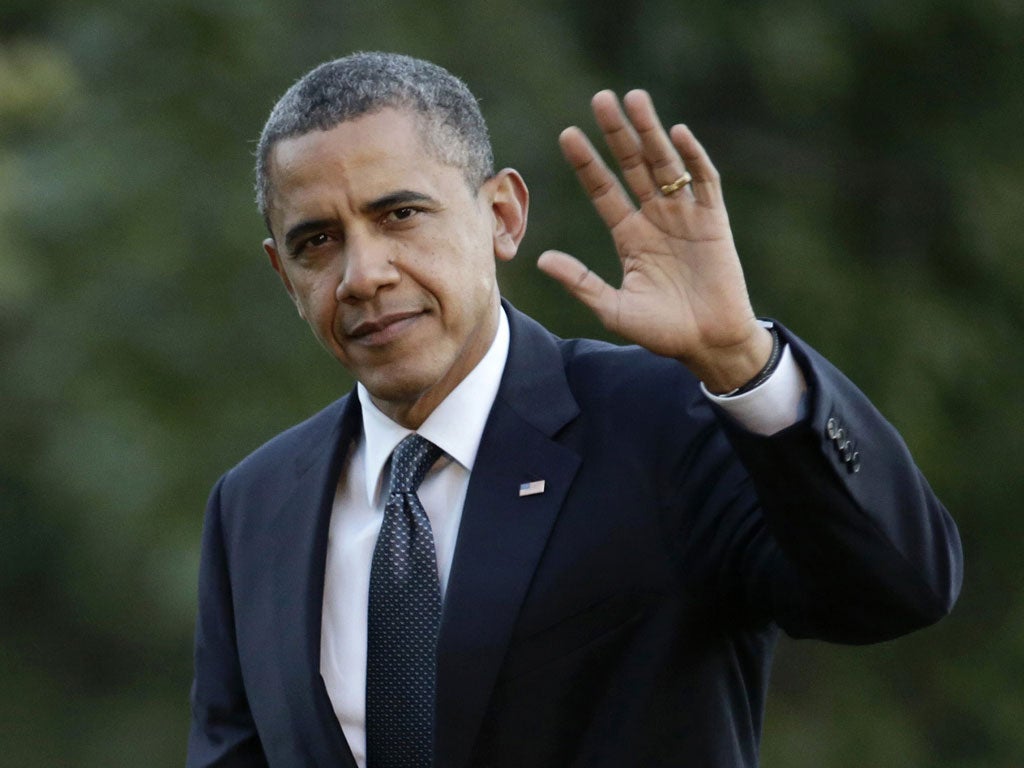Mitt Romney misfires in his attempt to discredit Barack Obama's 'weak' foreign policy

Your support helps us to tell the story
From reproductive rights to climate change to Big Tech, The Independent is on the ground when the story is developing. Whether it's investigating the financials of Elon Musk's pro-Trump PAC or producing our latest documentary, 'The A Word', which shines a light on the American women fighting for reproductive rights, we know how important it is to parse out the facts from the messaging.
At such a critical moment in US history, we need reporters on the ground. Your donation allows us to keep sending journalists to speak to both sides of the story.
The Independent is trusted by Americans across the entire political spectrum. And unlike many other quality news outlets, we choose not to lock Americans out of our reporting and analysis with paywalls. We believe quality journalism should be available to everyone, paid for by those who can afford it.
Your support makes all the difference.For most Americans, last week's images were a shock: attacks on US compounds and the murder of diplomats in countries they thought they had been helping since the so-called Arab Spring which some are now dubbing the Arab Nightmare.
The crisis and the presidential election overlay each other, and the inference from the right, of course, is that it has in part been created by President Barack Obama, right. By week's end, a Mitt Romney foreign policy adviser, Richard Williamson, was briefing reporters that if his man had been in the Oval Office none of this would have happened. In Libya, the US would have done more in "reconciliation and reconstruction efforts", he insisted.
With seven weeks until the US election, the peril for Mr Obama, who otherwise has gathered significant new polling momentum since his party's convention in Charlotte, is plain to see. To economic uncertainty now add foreign policy uncertainty. In their darkest moments, Democrats recall the 1979-80 Iranian hostage crisis that doomed Jimmy Carter's hopes of a second term. On foreign policy he was deemed weak and indecisive.
Can this be attached now to Mr Obama, as evidence mounts that the Benghazi raid was planned by militants possibly affiliated to al-Qa'ida? The US denies it had prior indications of the attack, but surely the date – 11 September – might have been enough for all overseas stations to have been put on high alert.
But it may be that most Americans will be watching what Mr Obama does now rather than blaming him for actions past, as Mr Romney did when he came out all barrels blazing on Wednesday, fiercely scolding the administration because of a statement issued by the US embassy in Cairo even before the trouble started in Libya that he considered too conciliatory to the protesters outside. Mr Romney even called it "apologetic".
That was seen widely as a blunder. But in the days since, Republicans have honed their message of a feeble Obama foreign policy stance. In a speech to conservative activists on Friday, Mr Romney's running mate, Paul Ryan, said Mr Obama had emboldened America's enemies in the Middle East. "Amid all these threats and dangers, what we do not see is steady, consistent American leadership," he said.
Yet the Republicans may still be miscalculating. Attacking any president during a time of national crisis is a risky proposition. It especially doesn't help if the president in question is at his very best politically at such times.
So it was on Friday, when every broadcast network joined the cable news channels in covering live a ceremony at Andrews air force base outside Washington DC receiving home the bodies of ambassador Christopher Stevens and the other three who were killed in Benghazi. A clearly emotional Hillary Clinton, the US Secretary of State, took the microphone first to pay tribute to her lost State Department colleagues and to assure Americans they had died in a battle still worth fighting. "The people of Egypt, Libya, Yemen and Tunisia did not trade the tyranny of a dictator for the tyranny of a mob," she said.
"There is no doubt these are difficult days," Mr Obama told mourners. "In moments such as this, so much anger and violence, even the hopeful among us must wonder. The United States of America will never retreat from the world. We will never stop working for the dignity and freedom that every person deserves."
As the President stepped back, Mrs Clinton looked at him, reached out and clasped his hand, just briefly, but it was a moment that spoke powerfully of shared grief and shared determination.
Mr Romney popped up a few minutes later in a bright red fleece in Ohio complaining about jobs. If elections are won in part on TV optics, last week should not have been Mr Obama's, with flames and smoke overseas. And yet somehow it probably was.
Join our commenting forum
Join thought-provoking conversations, follow other Independent readers and see their replies
Comments